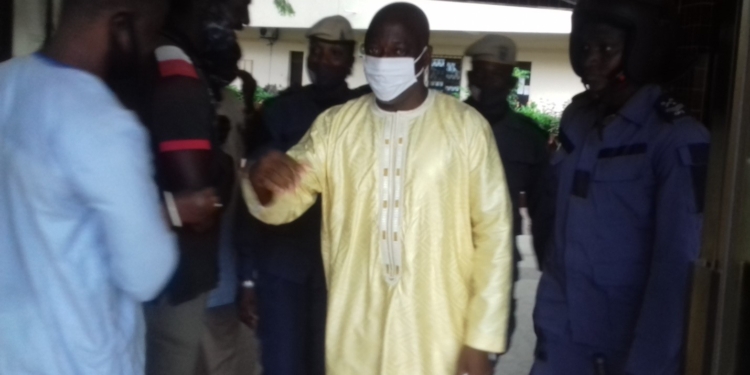By Rohey Jadama and Zainab Jobarteh
Former junta minister Yankuba Touray has constitutional immunity and should not be tried for murder, his lawyer told the High Court in Banjul.
Barrister Abdoulie Sissoho told Justice Ebrima Jaiteh that the 1997 Constitution of The Gambia shields his client and makes it illegal to try him.
Touray has been charged with the murder of a fellow junta minister, Ousman Koro Ceesay, whose body was found in his vehicle on Jambur Bridge in June, 1995.
The retired military officer-turned-politician had declined to take his plea in the case, invoking constitutional immunity, just as he had done at the Truth, Reconciliation and Reparations Commission, but the judge entered a not-guilty plea for him.
Touray was a long-serving minister of Local Government and Lands and a member of the Armed Forces Provisional Ruling Council (AFPRC), which assumed power after the 1994 coup that overthrew President Dawda Jawara and ended more than 30 years of the rule of the People’s Progressive Party.
“We rely on the facts before the court, particularly the undisputed facts of witnesses Ensa Mendy (second prosecution witness), Lamin Ndour, Amat Jangum, and Alagie Kanyi. All these witnesses, without a shadow of a doubt, said before this court, under oath, that the third defence witness (DW3) was a member of AFPRC from 1994 to 1997.
“Pursuant to section 13(1) and (5) of the 1997 Constitution’s Second Schedule, and having found that he is a member of the junta, no court or tribunal or body shall enquire about the activities or omissions of Yankuba Touray between 1994 and 1997. He cannot be tried under civil or criminal law,” said lawyer Sissoho.
He submitted that it was not about interpretation, but the right of the accused person not to be questioned or prosecuted. He cited a case by former Attorney General Abubacarr Ba Tambedou, who applied for the matter to be referred to the court for interpretation. The court on July 15, 2019 ruled that there was no evidence for referral.
“By virtue of section 13(1) and (5) of the Second Schedule of the 1997 Constitution, the powers of this court have been ousted. I humbly pray that this case be struck out because it is illegal to try the accused and it infringes on his rights.”
Section 13 (1) of Schedule Two of the 1997 Constitution states: “No member of the Armed Forces Provisional Ruling Council, any person appointed minister by the Armed Forces Provisional Ruling Council, or other appointees of the Armed Forces Provisional Ruling Council shall be held liable or answerable before a court or authority or under this Constitution or any other law, either jointly or severally, for an act or omission in the performance of his or her official duties.”
Section 13 (5) of the schedule adds: “It shall not be lawful for any court or tribunal to entertain an action instituted in respect of an act or omission against a person acting or omitting to act on the instructions or authority of the Armed Forces Provisional Ruling Council, or a member thereof, and alleged to be in contravention of any law, whether substantive or procedural, in existence before or during the administration of the Armed Forces Provisional Ruling Council.”
Sissoho asked the court to look at section 127 of the 1997 Constitution. The case continues on Monday, October 19, 2020. The defence counsel will continue with his application for constitutional immunity.
The prosecution has called nine witnesses in the case that started in October 2019. The defence counsel made a ‘no case to answer’ submission and urged the court to acquit and discharge Touray. However, the trial judge overruled the application and told Touray to open his defence.
The accused has called three witnesses – Mariama Minteh (his sister-in-law), Mamie Minteh (his wife), and himself.







